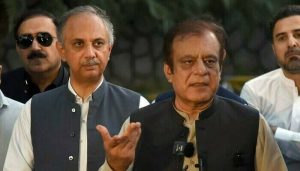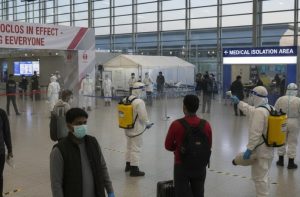LAHORE – Project Management Unit-Punjab Public Health Agency (PMU-PPHA), Primary and Secondary Healthcare Department, Punjab, organised a landmark event to celebrate ‘World Environmental Health Day 2017’ in collaboration with Unicef at a local hotel the other day.
Punjab Environment Protection Minister Begum Zakia Shahnawaz Khan, Primary and Secondary Healthcare Minister Khawaja Imran Nazir and Minister Specialised Healthcare and Medical Education Khawaja Salman Rafique, CEO PPHA Dr Shabnum Sarfraz, member Health Planning and Development Department Dr Shabana Haider and Secretary Environment Protection Department Saif Anjum attended the ceremony.
The celebrations were followed by a meeting of the technical working group in order to solidify long-term action plans for various policies including Punjab Environmental Health Strategy, Punjab Drinking Water Policy and other associated agendas. Human health is profoundly affected by weather and climate, and despite considerable progress in health services delivery and reforms over the last few years, a mixture of environmental health challenges is emerging as a threat to healthcare services in Punjab.

Deaths from extreme weather events such as heat stress, along with cardiovascular and respiratory diseases, infectious disease outbreaks, and malnutrition are on the rise. On top of that, Punjab is experiencing a population boom and consequently, the burden of disease on limited healthcare resources is reaching critical levels.
The effects of climate change aren’t limited to human health or healthcare systems either; they also undermine food and water supplies, overload the existing infrastructure, and stress existing social protection systems. Within the Punjab, water, sanitation and hygiene (WASH) issues, air quality, land pollution, fertile land erosion, and contamination of natural resources are leading to rapid environmental delegation.
Experts warn that Pakistan could approach “absolute scarcity” levels of water and face a drought as early as 2025. Together, these hazards pose not only threats to individual health, but also to economic growth, food security, and environmental sustainability in the province and for Pakistan.
Efforts to include environmental considerations in all phases of policy making, planning, and development must, therefore, be actively pursued.
Project Management Unit – Punjab Public Health Agency is working to coordinate efforts among cross-sectoral stakeholders for an integrated multidisciplinary public health approach in Punjab. Existing health challenges cannot be surmounted comprehensively without adapting the “One-Health Triad” approach, and Environmental Health is the third critical component of this model. Keeping this in perspective, the event was organised in a manner that gathered key stakeholders from government, health, environment, and development sectors, academia, civil society and the media.
The follow-up meeting of the technical working group culminated with a commitment to adopt measures that improve knowledge sharing and collaboration between various stakeholders and ensure sustainable action towards national and provincial policy agendas for environmental health, drinking water and sanitation. Dr Shabnum Sarfraz, Chief Executive Officer, welcomed the participants and contextualised environmental health in Punjab, its importance for human health and the need to adopt a cross-sectoral approach towards environmental challenges.
Speaking at the occasion, Dr Shabana Haider, member Health, Planning and Development Department, called on the stakeholders to increase cross sectoral collaboration and adopt effective measures to improve environmental health indicators in the Punjab.
Minister Begum Zakia Shahnawaz said addressing the interactions of environment and health is vital for sustainable development. Moreover, the government is committed to providing safe water and food, adequate shelter and clean air to all people for ensuring prosperity and growth.
Khawaja Salman Rafique highlighted the increasing burden of environmental factors on health systems and added that personal steps needed to be taken to combat the effects of climate change and its implications on human health.
Khawaja Imran Nazir emphasised upon the fact that environmental health today is not a single group’s challenge. We need meaningful engagement of everyone to improve people’s health and tackle emerging challenges, he said.
Saif Anjum, Environment Protection Department Secretary, said Environment Protection Department was keen to play an integral part in promoting healthy living practices and sustainable development to ensure long term viability.-Agencies













